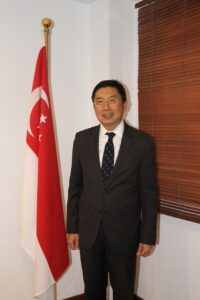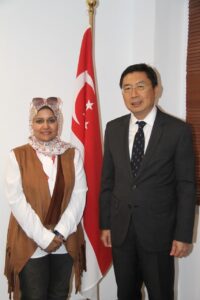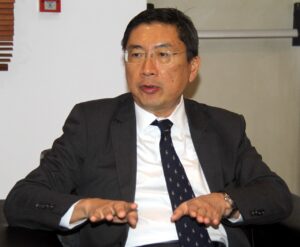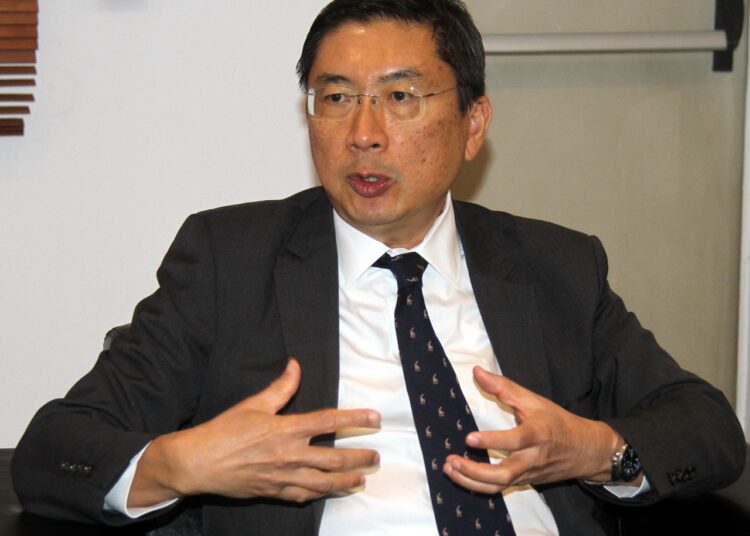In light of the current geopolitical changes coupled with the numerous global challenges like Covid-19, it is important to recall the successful expertise of some countries that have overcome challenges and achieved real progress. Singapore is a striking example of one such country.
After gaining independence in 1965, Singapore was a poor country with $400 per capita GDP. That figure is now estimated at $60, 000.
Singapore is to mark its national day on August 9 and Singapore’s Ambassador to Egypt Dominic Goh spoke to The Egyptian Mail highlighting spheres of joint co-operation with Egypt.
Egypt was one of the first countries to recognise Singapore politically in November 1966.

Vast opportunities ahead
Despite the Covid-19 pandemic, Singapore maintained contact with the Egyptian government.
“During the pandemic, Singapore signed an agreement with the Ministry of Communications and Information Technology by video conference to promote co-operation in artificial intelligence (AI),” the ambassador said.
The virtual signing ceremony was witnessed by Minister of Communications and Information Technology Amr Talaat and Josephine Teo, Singapore’s Minister for Communications and Information and Minister in Charge of Smart Nation and Cybersecurity. The agreement covers the AI Apprenticeship Programme (AIAP) and AI for Everyone (AI4E) in Egypt.
The agreement will help Egypt launch capacity-building programmes to promote the country’s AI capabilities. The agreement covers localising AI4E with Egypt’s Information Technology Institute, offered in Arabic on the internet as an awareness programme.
“Egypt is stepping up efforts in digital transformation in terms of the delivery of government services and online applications. These are positive steps,” the Singaporean envoy added.

Growing economic co-operation
On the economic level, the ambassador said trade volume is $600 million. Singapore exports electronic goods to Egypt. As for imports, Singapore imports fruit and vegetables.
“Egyptian oranges, grapes and strawberries are of high quality,” the ambassador said.
Although trade is not high, investments are promising.
“Singapore is the fourth biggest investor from Asia. We have more than one billion dollars investments in Egypt in logistics, food processing and industry,” he added.
There is a major Singapore company in Egypt making plastic bottles. Another big investment is by the Olam Group, which is a leading food and agri-business firm, supplying foodstuffs, animal feed and fibre to thousands of customers worldwide.
“Olam is one of the biggest agricultural commodities producers in the world. In Egypt, the company focused on two things. They buy onions from local farmers and then they process them into onion powder, which they then export. As for cotton, they are the biggest cotton exporter in Egypt,” the ambassador said.
“To promote trade, we need to find more businesses. Recently, we have a delegation from our trade promotion body to explore more opportunities.”
New horizons for co-operation
As for promising areas for co-operation, the ambassador said that training is a very important area for co-operation.
“Over the years, we have trained more than 500 Egyptian officials in various areas. We hope that we can do more and share our experience. Transport is another promising area for co-operation.”
The ambassador referred to the importance of political momentum, which helps open new horizons for co-operation.
“The exchange of visits between President Abdel Fattah El Sisi and his Singaporean counterpart Tony Tan Keng Yam in 2015 and 2016 gave extra boost to bilateral ties.”

National dialogue
The ambassador hailed the launch of national dialogue in Egypt, recalling Singapore’s experience in 2012 in this regard.
“ Launching the national dialogue is a good step. In Singapore, in 2012-2013, there was unhappiness among Singaporean people at that time about overcrowding and subsequent consequences in terms of fears of the growing gap between the rich and poor. That was why the dialogue was launched.”
The ambassador went on to say that national dialogue in Singapore was inclusive and all opinions were taken into consideration. After that, the government announced some policy changes, including improving public transport and healthcare.
“As for Egypt, national dialogue is important and this is how to create stronger society. So this dialogue would be very fruitful as long as it is communicated to people,” he said.
Joining hands ahead of COP27
Foreign Minister Sameh Shoukry and Climate Champion Mahmoud Mohieldin recently visited Singapore as part of preparations for COP27. The ambassador said such visits are recognition of the close relationship between the two countries. It is also recognition that Singapore plays an important role in the climate process.
“These meetings show that we want to work together in order to move climate process forward, and the priority is how to mobilise the required funding from the donors and private sector for developing countries whether in Africa or Asia.”
Meanwhile, the ambassador said climate change is everybody’s responsibility. As for Egypt’s initiative to organise five regional roundtables ahead of COP27, the ambassador believes that this shows that Egypt is trying to generate global consensus.
“This is very useful process. As for carbon market, Singapore can transfer its experience in this domain to Africa as it is developing its own carbon market. Even if we don’t see big steps due to global situation, but there are many steps forward.”






Discussion about this post